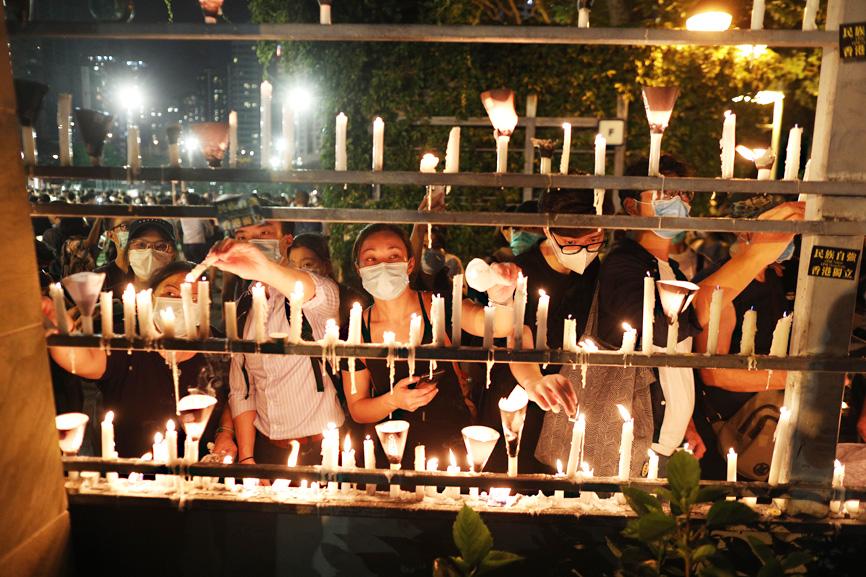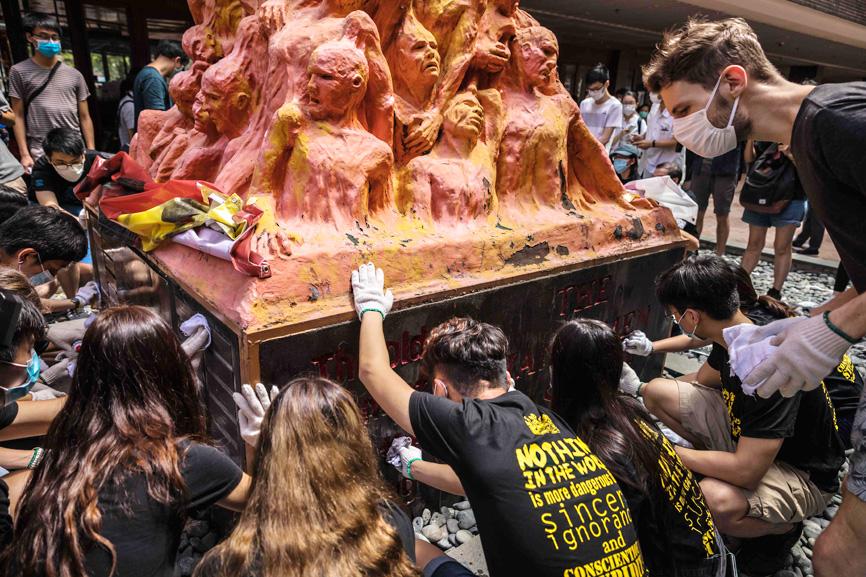Thousands of Hong Kong protesters yesterday lit candles and chanted democracy slogans as they defied a ban against gathering to commemorate the 31st anniversary of China’s Tiananmen Square Massacre, with tensions seething in the territory over new security legislation.
Crowds streamed into one of the territory’s main parks, which has hosted huge Tiananmen anniversary vigils over the past three decades, with smaller rallies erupting across the territory.
Police arrested some demonstrators in a shopping district, although they allowed the main rally at Victoria Park to proceed.

Photo: EPA-EFE
The displays of resistance came hours after the Hong Kong Legislative Council passed a bill criminalizing insults to China’s national anthem, which the pro-democracy movement sees as yet another example of eroding freedoms.
Beijing’s plans to impose security legislation on Hong Kong criminalizing treason and subversion have cemented fears that the semi-autonomous territory is losing its treasured liberties.
“I’ve come here for the vigil for 30 years in memory of the victims of the June 4 crackdown, but this year it is more significant to me,” a 74-year-old man surnamed Yip (葉) told reporters as he joined the crowds inside Victoria Park. “Because Hong Kong is experiencing the same kind of repression from the same regime, just like what happened in Beijing.”

Photo: AFP
Hundreds of people — by some estimates more than 1,000 — were killed in 1989, when the Chinese Communist Party deployed the military into Beijing’s Tiananmen Square to crush a student-led movement for democratic reforms.
Commemorations of the event are forbidden in China, but have been allowed in semi-autonomous Hong Kong, which has been granted liberties under the terms of its 1997 handover from the British.
This year’s vigil was banned, with authorities citing coronavirus restrictions on group gatherings.
However, thousands of people, including prominent democracy activists, poured into the park and lit candles as an act of remembrance and resistance.
Some wore black T-shirts with the word “Truth” emblazoned in white. Others were in office attire.
Many shouted pro-democracy slogans including: “Stand with Hong Kong” and “End one-party rule.”
Other candlelight vigils were held in local neighborhoods, shopping districts and churches across Hong Kong.
Crowds have swelled at Hong Kong’s Tiananmen vigils whenever fears have spiked that Beijing is prematurely stamping out the territory’s cherished freedoms, an issue that has dominated Hong Kong over the past 12 months.
The territory was engulfed by seven straight months of huge and often-violent pro-democracy protests last year — rallies that began five days after the last annual vigil.
In response to those demonstrations, Beijing last month announced plans to impose the security legislation, which would bypass Hong Kong’s legislature, saying that it is needed to tackle “terrorism” and “separatism” in a restless territory it now regards as a direct national security threat.
Critics, including many Western nations, fear that it will bring mainland-style political oppression to the territory.
In China, authorities do not allow any open discussion about the massacre and censors scrub any mention of it off the Internet. The candle emoji has been unavailable in the past few days on China’s microblogging platforms.
The Chinese Ministry of Foreign Affairs described international calls for Beijing to apologize for the crackdown as “complete nonsense.”

WAITING GAME: The US has so far only offered a ‘best rate tariff,’ which officials assume is about 15 percent, the same as Japan, a person familiar with the matter said Taiwan and the US have completed “technical consultations” regarding tariffs and a finalized rate is expected to be released soon, Executive Yuan spokeswoman Michelle Lee (李慧芝) told a news conference yesterday, as a 90-day pause on US President Donald Trump’s “reciprocal” tariffs is set to expire today. The two countries have reached a “certain degree of consensus” on issues such as tariffs, nontariff trade barriers, trade facilitation, supply chain resilience and economic security, Lee said. They also discussed opportunities for cooperation, investment and procurement, she said. A joint statement is still being negotiated and would be released once the US government has made

Authorities have detained three former Taiwan Semiconductor Manufacturing Co (TMSC, 台積電) employees on suspicion of compromising classified technology used in making 2-nanometer chips, the Taiwan High Prosecutors’ Office said yesterday. Prosecutors are holding a former TSMC engineer surnamed Chen (陳) and two recently sacked TSMC engineers, including one person surnamed Wu (吳) in detention with restricted communication, following an investigation launched on July 25, a statement said. The announcement came a day after Nikkei Asia reported on the technology theft in an exclusive story, saying TSMC had fired two workers for contravening data rules on advanced chipmaking technology. Two-nanometer wafers are the most

NEW GEAR: On top of the new Tien Kung IV air defense missiles, the military is expected to place orders for a new combat vehicle next year for delivery in 2028 Mass production of Tien Kung IV (Sky Bow IV) missiles is expected to start next year, with plans to order 122 pods, the Ministry of National Defense’s (MND) latest list of regulated military material showed. The document said that the armed forces would obtain 46 pods of the air defense missiles next year and 76 pods the year after that. The Tien Kung IV is designed to intercept cruise missiles and ballistic missiles to an altitude of 70km, compared with the 60km maximum altitude achieved by the Missile Segment Enhancement variant of PAC-3 systems. A defense source said yesterday that the number of

Taiwanese exports to the US are to be subject to a 20 percent tariff starting on Thursday next week, according to an executive order signed by US President Donald Trump yesterday. The 20 percent levy was the same as the tariffs imposed on Vietnam, Sri Lanka and Bangladesh by Trump. It was higher than the tariffs imposed on Japan, South Korea and the EU (15 percent), as well as those on the Philippines (19 percent). A Taiwan official with knowledge of the matter said it is a "phased" tariff rate, and negotiations would continue. "Once negotiations conclude, Taiwan will obtain a better